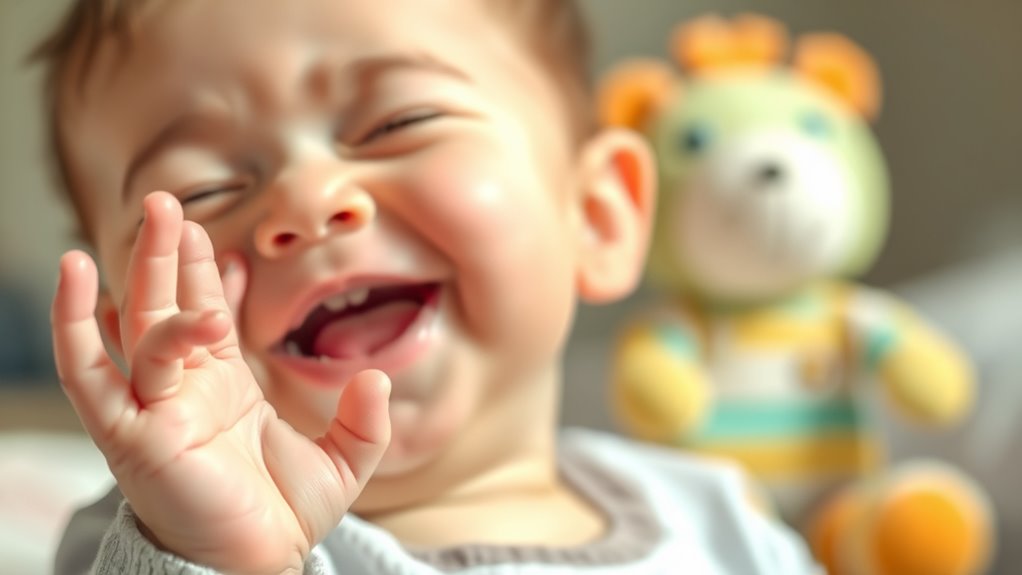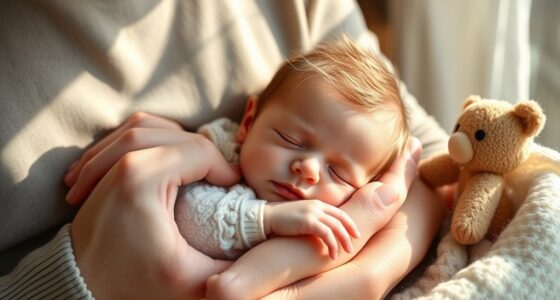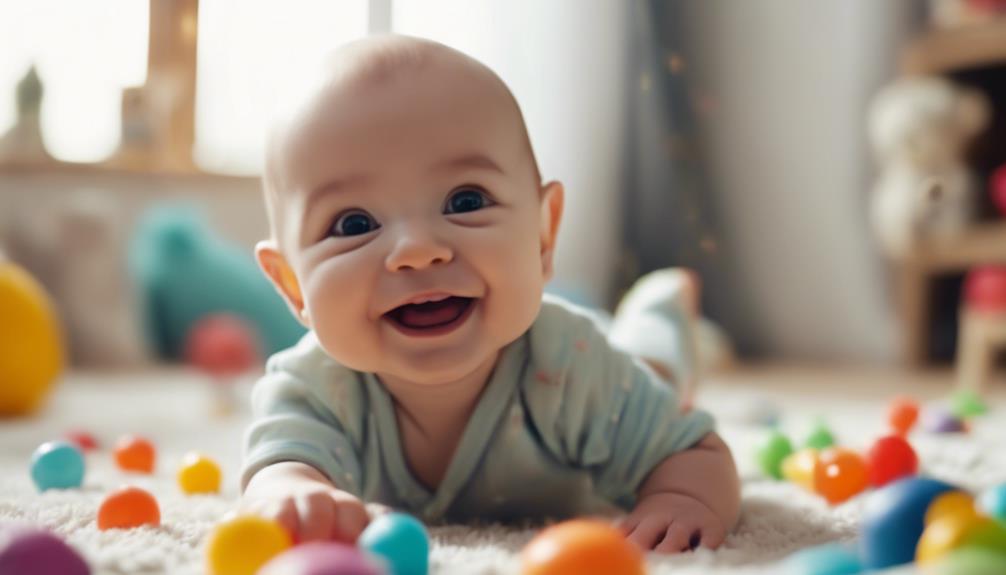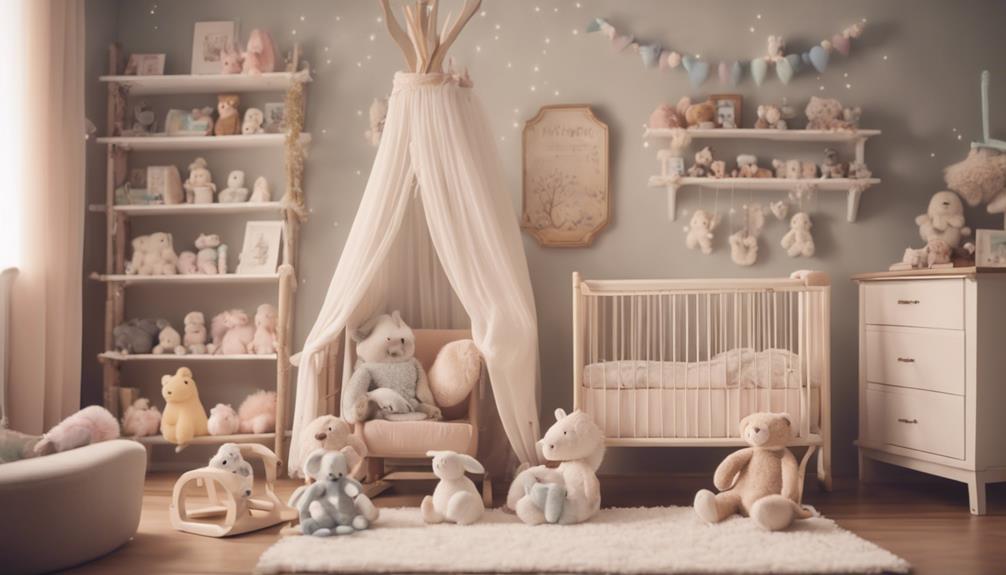Your baby’s giggles are more than adorable—they’re essential for emotional and social growth. When your little one laughs, it signals feelings like joy and curiosity, inviting your response and strengthening your bond. Responding with smiles or playful sounds reinforces their sense of safety and trust. Musical activities and shared laughter nurture this connection further, laying a foundation for future relationships. Keep exploring how these tiny moments can shape your baby’s emotional world and social skills.
Key Takeaways
- Baby giggles signal emotional security and foster strong social bonds with caregivers.
- Laughter invites reciprocal interactions that promote social skills and emotional intelligence.
- Musical activities enhance giggling, strengthening emotional connection and developmental growth.
- Responding warmly to giggles reinforces attachment and supports healthy emotional development.
- Recognizing and encouraging these joyful moments nurtures a child’s social, emotional, and cognitive skills.
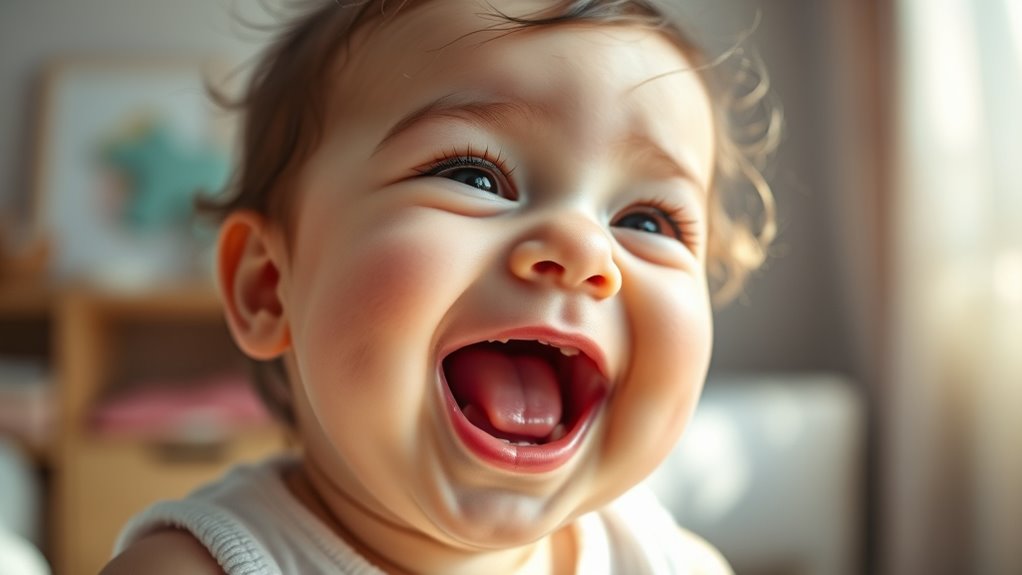
Have you ever wondered why a baby’s giggle can brighten your entire day? That infectious sound isn’t just adorable; it’s a powerful signal of emotional and social development. When your baby laughs, it triggers a cascade of positive emotions for you and others around them. This isn’t just about cuteness—it’s about connection. One way to understand the importance of these giggles is through the lens of music therapy. Gentle, playful sounds and rhythms often evoke laughter in babies, and engaging in musical activities can strengthen your bond. Singing, humming, or playing simple instruments with your little one creates a shared experience that promotes social bonding. These moments aren’t just fun; they serve as foundational steps in building trust and attachment.
Your baby’s giggles also act as social signals, communicating their feelings and encouraging reciprocal interactions. When they laugh, they’re expressing joy, curiosity, or relief, and it invites you to respond. This back-and-forth nurtures social skills and emotional intelligence. By responding with smiles, gentle words, or playful sounds, you’re reinforcing their understanding of social cues. Over time, these exchanges help your baby grasp the concept of give-and-take, essential for future friendships and relationships. It’s a cycle of mutual reinforcement that builds confidence and a sense of security.
Music therapy, whether formal or informal, can amplify these social bonds. Participating in musical play stimulates areas of the brain involved in emotional processing and social connection. For example, singing lullabies or engaging in rhythmic clapping not only entertain but also help your baby recognize patterns, improve their hearing, and develop coordination. These activities also foster a sense of shared joy, making your bond stronger. The beauty of music therapy lies in its simplicity: it’s accessible, adaptable, and deeply effective at fostering emotional closeness. Additionally, research supports the use of 16PF personality traits to understand individual differences in responses to social and musical engagement, helping tailor activities to your baby’s unique temperament.
Every giggle your baby shares is a reminder of the importance of these early social interactions. It’s a sign that they’re developing key emotional and social skills, and it’s a moment for you to celebrate and engage further. When you respond to their laughter with enthusiasm and warmth, you reinforce their sense of safety and belonging. This emotional foundation is essential for healthy development. So next time your baby giggles, remember that those tiny sounds are more than just adorable—they’re a crucial part of their growth, nurtured through playful music, shared joy, and heartfelt social bonding.
Frequently Asked Questions
Can a Baby’s Giggles Predict Their Future Emotional Health?
You might wonder if your baby’s giggles can predict their future emotional health. Research suggests that early laughter fosters emotional resilience and strengthens social bonding. When you encourage this joy, you help your little one develop positive emotional patterns that last. So, those giggles aren’t just adorable—they’re building blocks for a healthy, resilient mind. By nurturing this happiness, you support your child’s ability to handle life’s emotional ups and downs.
How Do Different Environments Influence a Baby’s Giggle Frequency?
Different environments greatly influence your baby’s giggle frequency. When you provide rich environmental stimulation and engage in positive social interactions, your baby is more likely to giggle often. Bright, playful settings encourage curiosity and joy, prompting more laughter. Conversely, a dull or overstimulating environment can reduce giggles. By creating a balanced, stimulating atmosphere filled with love and interaction, you foster your baby’s happiness and emotional development through frequent giggles.
Are There Specific Sounds That Trigger More Giggles in Babies?
You’ll find that funny faces and playful sounds often trigger more giggles in your baby. When you make silly faces or imitate animal sounds, you engage their curiosity and sense of humor. Babies naturally respond to these playful sounds because they’re surprising and entertaining. Keep experimenting with different voices, sounds, and expressions, and you’ll notice their giggles become more frequent, strengthening your bond and encouraging their social development.
What’S the Best Way to Encourage More Laughing in Shy or Serious Babies?
You can encourage more laughing in shy or serious babies through playful interactions and gentle teasing that make them feel comfortable. Use soft, funny voices or silly faces to spark their interest, and give them time to warm up. Remember, patience is key—allow them to observe and join in at their own pace. By creating a relaxed environment, you help your baby feel safe and more likely to giggle naturally.
Can a Baby’S Giggle Indicate Early Signs of Developmental Delays?
While a baby’s giggle is often seen as a sign of joy, it can also hint at developmental delays if absent or unusual. You should monitor your baby’s milestones and note parent observations, especially if they don’t smile or laugh by expected ages. Though giggles aren’t definitive, their absence might warrant a conversation with your pediatrician to guarantee healthy development and early intervention if needed.
Conclusion
So next time your baby bursts into giggles, remember it’s more than just adorable noise. Those little laughs boost their emotional health and strengthen your bond. For example, imagine a toddler who giggles every day during playtime—research shows they develop better social skills over time. Your baby’s giggles aren’t just cute; they’re a essential part of their growth. So keep the laughs coming—your little one’s happiness is worth it!

